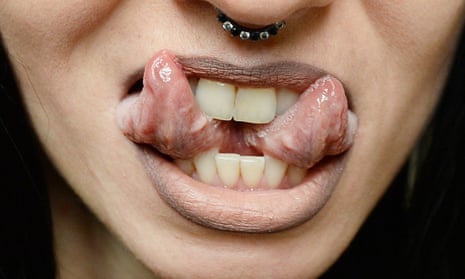People who have their tongues split or get mouth piercings are putting their health at serious risk, surgeons have warned.
Tongue splitting, which involves cutting the tongue in half to create a lizard-like forked effect, has gained popularity among body modification enthusiasts.
Experts say it can lead to complications such as significant blood loss, infection, nerve damage and problems with breathing and swallowing.
They say tongue and lip piercings cam also cause tooth fractures and gum damage.
More than half of tongue piercings and one in five lip piercings carried out for people between the ages of 16 and 24 are believed to result in complications, according to the Royal College of Surgeons.
The British Association of Oral and Maxillofacial Surgeons (BAOMS), whose members deal with potentially life-threatening infections and other problems caused by oral piercings and tongue splitting, said anyone having this kind of modification should go to hospital urgently if bleeding or infection occurred.
The group’s chair, Patrick Magennis, said: “Although skin can be cleaned with antiseptic before piercings, the mouth cannot be cleaned in the same way. There is always a mix of germs, good and bad, and breaching the protective lining can let in a life-threatening bug.
“It is unlikely that this advice will stop those who wish to pierce or modify their mouth or tongue, but people having this done to them must understand the risk and attend an oral and maxillofacial surgery department urgently if an infection begins to develop or if bleeding results. Their life could depend on it.”
The Faculty of Dental Surgery (FDS) at the Royal College of Surgeons of England and the British Association of Plastic Reconstructive and Aesthetic Surgeons (BAPRAS) backed the warning.
In March, the court of appeal found tongue splitting to be illegal when performed by a body modification practitioner for cosmetic purposes, even in instances where consent was sought. The ruling applied to England and Wales.
The medical groups said the legal status of the practice in the rest of the UK was unclear and there was an urgent need for it to be resolved.
Selina Master, of the FDS, said: “The FDS and BAPRAS are also concerned that despite the legal debate, the demand for tongue-splitting procedures may continue but simply be driven underground. “We would strongly advise people not to have oral piercings or tongue splits. However, if they do, it is crucial they see their dentist on a regular basis so that the impact on their oral health can be closely monitored. Never try to carry out one of these procedures on yourself or others.”
